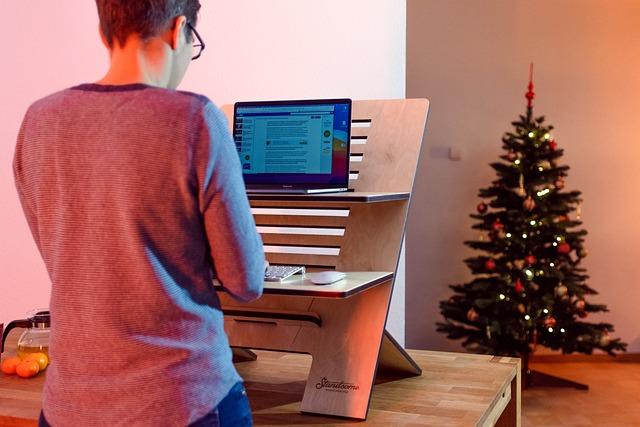How to Answer “Describe Your Ideal Work Environment”: Workplace Preferences
Have you ever been asked to describe your ideal work environment during a job interview and found yourself feeling unsure about how to respond? In this article, we will explore why employers ask this question and provide you with valuable insights on how to craft a compelling response that showcases your workplace preferences and values. By the end of this read, you will feel confident in articulating the type of environment that best suits your working style and enhances your productivity. Let’s dive in!
Contents
- Understanding the Importance of Describing Your Ideal Work Environment
- Identifying Key Factors that Contribute to a Positive Work Environment
- Highlighting Your Work Preferences in a Professional Manner
- Emphasizing the Importance of Cultural Fit in Workplace Preferences
- Addressing Communication Styles and Team Dynamics in Work Environment
- Considering Physical Workspace and Work-Life Balance in Your Ideal Environment
- Providing Examples and Specific Details to Support Your Preferences
- Offering Tips for Tailoring Your Answer to Different Job Interviews
- Staying Authentic and Genuine in Expressing Your Work Environment Preferences
- The Conclusion
Understanding the Importance of Describing Your Ideal Work Environment
When asked to describe your ideal work environment, it’s important to consider what factors are most important to you in a workplace. Your response can give potential employers insight into whether you would be a good fit for their company culture. Here are some key points to keep in mind when crafting your answer:
- Think about your preferences: Consider what type of environment brings out the best in you. Do you thrive in a fast-paced, dynamic setting, or do you prefer a more relaxed, collaborative atmosphere?
- Consider the physical environment: Think about factors such as office layout, noise levels, and lighting. Do you prefer an open office layout or individual workspaces? How important is natural light to you?
- Reflect on team dynamics: Think about how you work best with others. Do you prefer working independently, or do you thrive in a team environment? Consider the level of collaboration and communication that is important to you.
| Preference | Importance |
|---|---|
| Open office layout | High |
| Collaborative team environment | Medium |
| Natural light | Low |
Overall, describing your ideal work environment is an opportunity to showcase your self-awareness and understanding of what helps you perform at your best. By articulating your preferences clearly and confidently, you can help potential employers see how you would fit into their organization and contribute to the team.

Identifying Key Factors that Contribute to a Positive Work Environment
When describing your ideal work environment, it’s essential to consider the key factors that contribute to a positive workplace. These factors can vary from person to person, but there are some common elements that most people value in a work environment.
- Positive Company Culture: A positive company culture can make a significant impact on employee satisfaction. This includes things like supportive co-workers, open communication, and a healthy work-life balance.
- Effective Leadership: Strong leadership plays a crucial role in creating a positive work environment. Employees thrive when they feel heard, valued, and supported by their managers.
- Opportunities for Growth: Professional development and growth opportunities are essential for employee engagement. Opportunities for training, advancement, and skill development can contribute to a positive work environment.
Ultimately, your ideal work environment should align with your values, preferences, and career goals. By understanding the key factors that contribute to a positive work environment, you can better articulate your workplace preferences during a job interview or when asked to describe your ideal work environment.

Highlighting Your Work Preferences in a Professional Manner
When asked to describe your ideal work environment, it’s important to highlight your preferences in a professional and well-thought-out manner. By effectively communicating your workplace preferences, you can demonstrate to potential employers that you are self-aware and understand what type of environment brings out the best in you.
Key Points to Consider:
- Focus on the work culture: Highlight aspects such as collaboration, innovation, autonomy, or structure that align with your values.
- Emphasize the importance of a supportive team: Mention the significance of working with colleagues who are respectful, communicative, and team-oriented.
- Address the physical work environment: Discuss how factors like natural light, open spaces, or quiet areas impact your productivity and overall well-being.
By articulating your ideal work environment in a professional manner, you can convey to potential employers that you are intentional about your career choices and are seeking a workplace where you can thrive and contribute effectively.

Emphasizing the Importance of Cultural Fit in Workplace Preferences
When it comes to describing your ideal work environment, cultural fit is a crucial aspect that can often be overlooked. Understanding the values, beliefs, and behaviors that make up a company’s culture can greatly impact your job satisfaction and overall success in the role.
So, how can you effectively answer the question, “Describe your ideal work environment”? Here are some key points to consider:
- Company Values: Highlight the importance of aligning with the values of the organization. This can include teamwork, innovation, or work-life balance.
- Collaborative Environment: Mention your preference for a workplace that fosters open communication, collaboration, and a sense of community among colleagues.
- Work-Life Balance: Express the need for a healthy balance between work and personal life, emphasizing the importance of well-being and flexibility in the workplace.
| Company | Values |
|---|---|
| Company A | Teamwork and Innovation |
| Company B | Diversity and Inclusion |
By emphasizing the importance of cultural fit in your workplace preferences, you can showcase your awareness of the impact it can have on your professional experience and demonstrate your commitment to finding the right fit for both yourself and the organization.

Addressing Communication Styles and Team Dynamics in Work Environment
When asked to describe your ideal work environment, it’s important to consider factors that contribute to effective communication styles and positive team dynamics. Your response should reflect your ability to work well with others and thrive in a collaborative setting. Highlighting your preferences can help potential employers understand how you approach teamwork and communication in the workplace.
One way to answer this question is to emphasize the importance of open communication and transparency. Mentioning your preference for a work environment where team members are encouraged to share ideas and provide feedback can demonstrate your commitment to fostering a positive and inclusive atmosphere. Additionally, you can discuss your desire for clear expectations and regular check-ins to ensure that everyone is on the same page.
Another aspect to consider is your preference for a supportive and respectful work environment. Highlighting your belief in the value of diversity and inclusion can show your commitment to creating a space where all team members feel valued and respected. Mentioning your ability to adapt to different communication styles and work collaboratively with a diverse group of individuals can further showcase your flexibility and interpersonal skills.
In summary, when describing your ideal work environment, focus on aspects that promote effective communication styles and positive team dynamics. Emphasize the importance of open communication, transparency, and support for diversity and inclusion. By highlighting these preferences, you can demonstrate your ability to thrive in a collaborative work environment and contribute to a positive team dynamic.

Considering Physical Workspace and Work-Life Balance in Your Ideal Environment
When considering your ideal work environment, it’s important to think about both the physical workspace and work-life balance. Your physical workspace plays a significant role in your overall productivity and satisfaction at work. It’s crucial to have a comfortable and functional workspace that meets your needs.
Some factors to consider when describing your ideal physical workspace include:
- Access to natural light: Natural light can boost mood and productivity.
- Ergonomic furniture: Comfortable chairs and desks can prevent physical strain.
- Noise levels: Some people work best in quiet environments, while others thrive in a more lively atmosphere.
- Collaborative spaces: Having areas for team collaboration can enhance creativity and communication.
Work-life balance is another important aspect to consider when describing your ideal work environment. Finding the right balance between work and personal life is essential for overall well-being and job satisfaction. Consider factors such as:
- Flexible work hours: Being able to adjust your work schedule to accommodate personal commitments.
- Telecommuting options: Working from home can reduce commuting stress and increase productivity.
- Health and wellness programs: Access to gym facilities or wellness programs can promote a healthy lifestyle.
- Company culture: A supportive and inclusive company culture can contribute to a positive work-life balance.

Providing Examples and Specific Details to Support Your Preferences
When asked to describe your ideal work environment, it’s essential to provide examples and specific details to support your preferences. This will not only show that you have thought about what you need to be successful but also demonstrate your ability to communicate effectively.
One way to provide examples is to talk about the physical environment you thrive in. For instance, you could mention that you prefer a quiet workspace with natural light and ergonomic furniture. This shows that you are attentive to your well-being and productivity.
Another way to support your preferences is to discuss the culture and values of an ideal work environment. You might mention that you thrive in a collaborative setting where teamwork is encouraged, or that you value a company that prioritizes work-life balance. These examples give insight into what motivates you and what you value in a workplace.
In summary, when answering questions about your ideal work environment, remember to provide specific examples and details to support your preferences. This will help the interviewer get a clear picture of what is important to you and how you fit within their organization.

Offering Tips for Tailoring Your Answer to Different Job Interviews
When asked to describe your ideal work environment in a job interview, it’s important to tailor your answer to fit the specific company and role you are applying for. Here are some tips to help you craft a response that will impress your interviewer:
– Research the company culture: Before your interview, take some time to research the company’s values, mission, and culture. This will give you insight into the type of work environment that is likely to exist at the organization.
– Match your preferences to the company’s culture: When describing your ideal work environment, try to align your preferences with the company’s culture. For example, if the company is known for its collaborative team environment, emphasize your desire to work in a team setting.
– Be specific: Instead of giving a generic answer, provide specific details about what you value in a work environment. For example, you could mention that you thrive in a fast-paced, dynamic environment where you have the opportunity to take on new challenges.
– Stay positive: When describing your ideal work environment, focus on the positives rather than negatives. Instead of saying what you don’t like, emphasize what you do like and how it aligns with the company’s values.
In conclusion, by researching the company culture, aligning your preferences with the organization’s values, being specific, and staying positive, you can tailor your answer to “Describe Your Ideal Work Environment” to impress your interviewer and increase your chances of landing the job.
Staying Authentic and Genuine in Expressing Your Work Environment Preferences
When asked to describe your ideal work environment, it’s important to stay true to yourself and express your genuine preferences. It’s easy to get caught up in trying to give the “right” answer, but remember that being authentic is key. Here are some tips on how to effectively communicate your workplace preferences:
- Reflect on past experiences: Think about previous work environments where you felt most productive and satisfied. What aspects of those environments contributed to your success?
- Consider your work style: Are you someone who thrives in a fast-paced, collaborative setting, or do you prefer a quiet, independent workspace? Be honest about what works best for you.
- Focus on values: Think about the values that are important to you in a work environment, such as transparency, respect, or innovation. These can help guide your description of your ideal workplace.
Remember, there is no one-size-fits-all answer to this question. What matters most is that you are able to communicate your preferences in a clear and confident manner. By staying authentic in expressing your work environment preferences, you can help ensure that you find a workplace that aligns with your values and working style.
The Conclusion
In conclusion, being able to articulate your ideal work environment is crucial in finding a job that is the right fit for you. Remember to focus on your values, preferences, and how they align with the culture of the organization. By preparing thoughtful and honest responses, you can increase your chances of landing a job that truly fulfills you. So, next time you’re asked to describe your ideal work environment, take a moment to reflect on what truly matters to you and communicate it confidently. Good luck in your job search!







